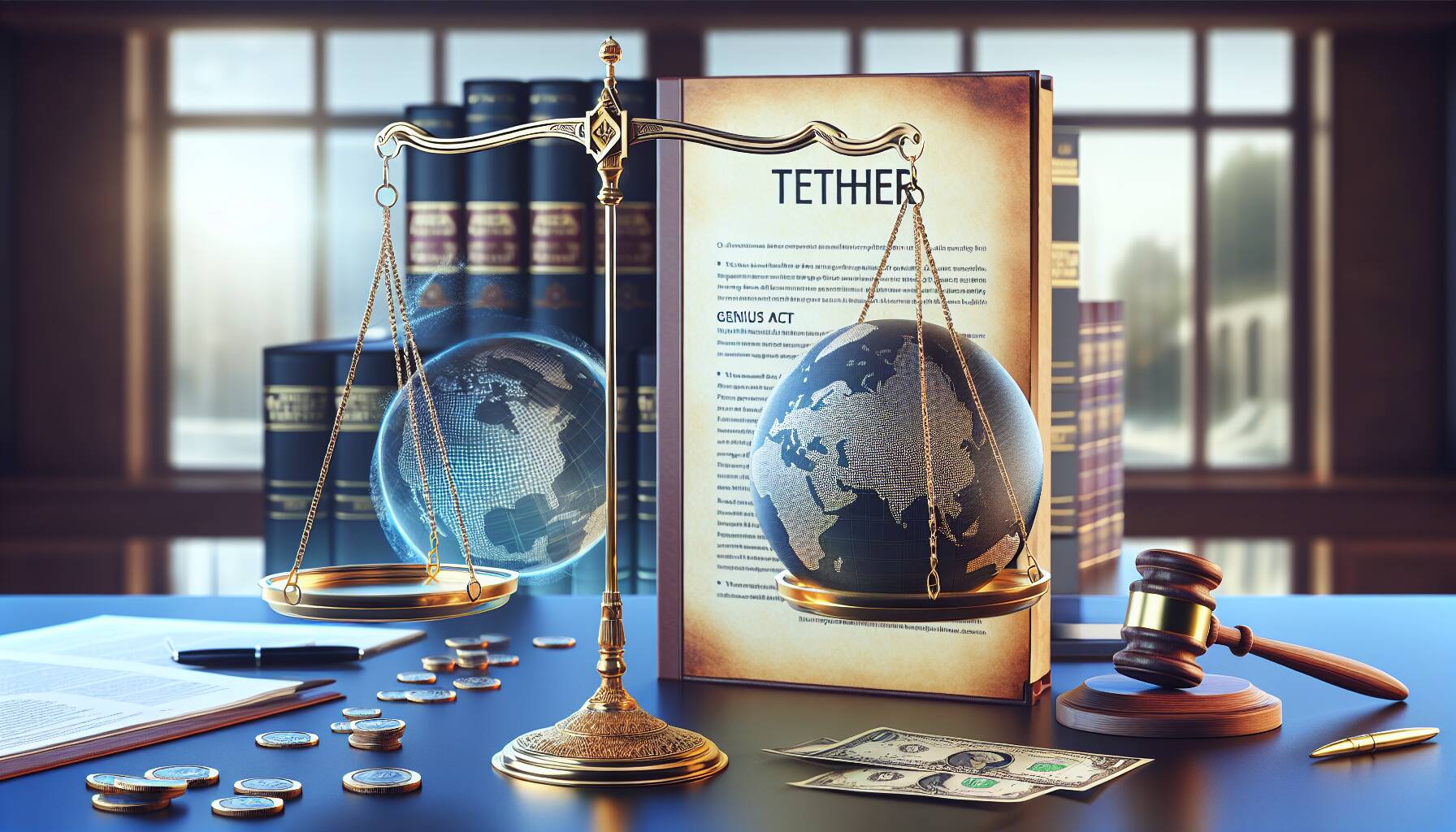Tether’s USDT stands as the dominant stablecoin in the cryptocurrency space, representing a digital counterpart to the U.S. dollar with an astonishing market cap of around $155 billion. However, as U.S. lawmakers gear up to push the Guiding and Establishing National Innovation for U.S. Stablecoins of 2025 (GENIUS) Act towards legislation, questions are mounting about Tether’s compliance with emerging regulatory standards. The bill, which marks a pivotal moment for cryptocurrency regulation, is set to face its final votes in the Senate before being sent to the House of Representatives.
Under the proposed regulations, foreign stablecoin issuers like Tether would face significant hurdles to offer their products in the U.S. market. They would need to be regulated by foreign authorities that align with U.S. standards and meet stringent reserve requirements. This includes maintaining sufficient liquid assets to manage customer liquidity needs, undergoing monthly audits, and abiding by stringent anti-money laundering laws. The potential implications for Tether could involve hefty investments in compliance efforts, prompting some experts to speculate whether the company will prioritize U.S. market access or focus on burgeoning markets elsewhere.
“If I’m Tether, I’m not going to rush into the United States until I know what the regulations are,” said Steve Gannon, emphasizing the substantial responsibilities that compliance could entail.
While Tether has been establishing its presence in countries with less regulatory scrutiny, such as El Salvador, the GENIUS Act allows for the possibility of exemptions granted by the Secretary of the Treasury. This has raised eyebrows among critics, including Senator Elizabeth Warren, who argues the bill could inadvertently create loopholes for foreign stablecoins to operate in the U.S. without adequate oversight.
Tether’s CEO, Paolo Ardoino, has hinted that the firm may consider launching a fully regulated settlement stablecoin in the U.S. rather than trying to adapt its existing business model. However, with significant uncertainty surrounding the final regulatory landscape, the future remains unpredictable for U.S. operations of Tether and other foreign stablecoin issuers.
“This is a politically contentious area,” noted Richard Rosenthal, highlighting the complexities that will influence how foreign stablecoins navigate the new regulations.
As the GENIUS Act advances, the question remains: will firms like Tether pivot towards U.S. compliance, or will they continue to thrive in less regulated markets while facing growing competition from U.S.-based players like Circle and its USDC? The evolving regulatory landscape may reshape the dynamics of the stablecoin market significantly, marking a new chapter in the saga of cryptocurrency regulation.

Tether and the Future of Stablecoins in the U.S.
Key Points:
- Tether’s Market Position: Tether’s USDT is the leading stablecoin with a market cap of 155 billion.
- Compliance Challenges: Upcoming U.S. legislation may impose stringent compliance requirements for Tether and foreign stablecoin issuers.
- GENIUS Act Significance: The GENIUS Act could markedly affect how Tether operates, requiring adherence to U.S. financial regulations.
- Foreign Regulation Approval: Tether would need to be regulated by an approved foreign regime to serve U.S. customers.
- Reserve Requirements: Issuers must maintain reserves in U.S. financial institutions and undergo monthly audits.
- Executive Accountability: Tether’s executives could be held legally liable for misleading the public about financial standing.
- Potential Market Shift: Tether may focus on emerging markets rather than rushing to meet U.S. regulation; implications for global crypto landscape.
- Reciprocity Exemptions: Future agreements could allow Tether access to the U.S. market despite regulatory hurdles.
- Impact on Competition: Competitors like Circle are poised to capture market share if Tether remains outside the U.S. financial system.
Impact on Readers’ Lives:
Understanding these regulatory changes is crucial for investors and users of stablecoins, as they may affect the availability and security of their digital assets, influencing investment strategies and financial planning.
Comparative Analysis of Tether’s USDT and Regulatory Implications from the GENIUS Act
Tether’s USDT remains unrivaled as the leading stablecoin globally, boasting an approximate issuance of 155 billion tokens. However, with the impending GENIUS Act looming on the legislative horizon, Tether faces a potential crossroads: become compliant with new stringent U.S. regulations or continue to harness its success in international markets, particularly those with less regulatory oversight. The implications of this legislation could change the dynamics for various players in the cryptocurrency arena.
Competitive Advantages: Tether’s established presence provides it with a formidable advantage, as it is well-entrenched in global markets, particularly emerging economies. The launch of the GENIUS Act could pave the way for other foreign stablecoin issuers, creating a potential marketplace that benefits established entities like Tether that are adept at navigating regulatory environments elsewhere. For instance, Tether’s headquarters in El Salvador positions it uniquely if the U.S. government decides to leverage reciprocity agreements with their country’s regulatory system.
Competitive Disadvantages: Conversely, Tether’s potential aversion to U.S. market entry may create vulnerabilities should the bill pass without adequate protective measures for their interests. As competitors like Circle with USDC gear up to dominate the U.S. landscape, Tether could miss a significant opportunity should traditional financial providers embrace these new digital assets post-regulation. Furthermore, the GENIUS Act imposes rigorous liquidity standards and transparency requirements that Tether may find challenging to meet without considerable investment in compliance frameworks.
This complex regulatory framework could pose challenges for Tether while simultaneously offering an opening for other entities to surge ahead in the U.S. market. Should Tether choose to remain passive, it risks losing a foothold in a burgeoning arena that seeks to expand with enhanced regulatory backing. Complications arise for investors and stakeholders within Tether’s ecosystem, as the company’s operations might face heightened scrutiny which could lead to instability in value, especially if regulatory compliance is not achieved.
Who Could Benefit or Face Problems: As a massive player in the crypto space, Tether’s decisions will significantly impact investors eager to access U.S. markets. If Tether adheres to the proposed legislation, it could lead to a more transparent and trustworthy stablecoin environment, benefiting consumers. However, this stringent compliance might drive away existing users who favor the current decentralized nature of stablecoins. On the other hand, firms like Circle could capitalize on Tether’s hesitance, attracting users and institutional investors seeking reliable, compliant options, ultimately exacerbating Tether’s competitive challenges.














